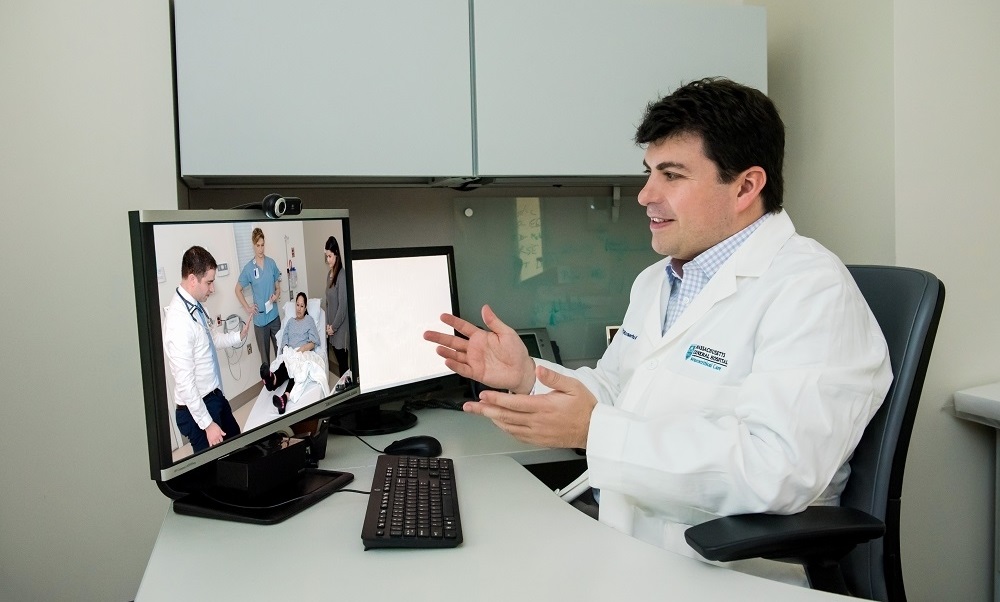NewsOct | 9 | 2020
Mass General Center for TeleHealth Helps Hospitals in New York and Maine Launch TeleStroke Services Within Local Regions


As the demand for virtual health services rapidly increases, Massachusetts General Hospital's Center for TeleHealth has implemented a hybrid model in Maine and Glen Falls, New York, enabling organizations to launch their own TeleStroke programs.
Northern Light Health and Glens Falls Hospital (GFH) have independently leveraged this transformative model to create their own TeleStroke networks built on the same experience, processes and technology used at Mass General.
Jennifer MaskalaOur collaboration with Massachusetts General has allowed us to effectively and efficiently treat stroke patients at six Maine community hospitals by providing 24/7/365 access to specialists. This relationship is helping to ensure Mainers in even the most rural communities have access to advanced lifesaving care close to home anytime they need it.
Director of TeleHealth Services, Northern Light Health
These institutions can use their new telehealth platform to virtualize their own stroke specialists who are unavailable physically but can be accessed through phone or video. In addition, staff can reach the Mass General acute stroke service on an as-needed basis.
“One of the key goals is to spread the word about the importance of TeleStroke in treating ischemic stroke and reducing stroke-related disability in patients in rural areas who would not normally have access to stroke care. The long-term goal is to try to launch more programs like these in such resource-poor areas to increase access to stroke care,” says Anand Viswanathan, MD, director of Mass General's TeleStroke Services and associate professor of neurology at Harvard Medical School. “Already these were very important considerations given the distances between rural areas and cities and levels of specialty available in these hospitals, but the COVID-19 pandemic has exacerbated that and brought it more to light in rural regions, especially when travel is more restricted. This is where a telepresence is even more important and can have an even greater impact.”
TeleStroke services provide rural or more isolated health centers access to vascular neurologists 24 hours a day, seven days a week, to treat acute stroke. Through a video consultation, experts can review imaging and examine patients at these centers to help diagnose and recommend a plan of care and further communicate and exchange notes through a web portal.
In a medical event like stroke where time to treatment is so critical, TeleStroke allows patients in rural areas to receive life-saving care they might not have otherwise unless they were in a large city with a specialty center.
“Patients in these locations with chronic diseases can be transported to larger centers for specialized treatment,” says Viswanathan. “But with stroke, since the time to treatment is so important, by the time they could be transported to a hospital like Mass General they would be out of the treatment window.”
Glens Falls Hospital sees nearly 500 stroke cases per year, but the closest level 1 trauma center is about one hour away.
In an effort to improve patient care and establish consistent work-flows for the emergency department staff, Cassandra Moore, RN, director of the Glens Falls Neurology & Stroke Program, sought out TeleStroke services.
“We feel very passionate about delivering stroke care to our community, and we only have two neurologists who, prior to the launch of our Mass General partnership, we’re always on-call to provide 24/7 coverage, partnering with Mass General provides stability to our neurology service,” Moore says. “Along with the video-conferencing software, GFH and Mass General share time sensitive brain imaging across a secure cloud network to help with the diagnosis of stroke and have integrated IT systems to ensure documentation is flawless in these urgent situations." Northern Light Health has implemented these hybrid TeleStroke program at six out of its 10 hospitals, which includes online portal access and video consultations for overnight and over the weekends. The system initiated its go-live dates throughout the month of August and saw at least 14 consultations.
Jennifer Maskala, director of TeleHealth Services at Northern Light Health, is already seeing the benefit to the community and patients.
“Our collaboration with Massachusetts General has allowed us to effectively and efficiently treat stroke patients at six Maine community hospitals by providing 24/7/365 access to specialists,” Maskala says. “This relationship is helping to ensure Mainers in even the most rural communities have access to advanced lifesaving care close to home anytime they need it.”
Although it is rare to have simultaneous consults, Viswanathan says the team at Mass General has back-up built into the system.
“We have both stroke fellows and attendings with high-level stroke expertise, and we are capable of doing multiple consults at one time with two or three doctors, if necessary,” says Viswanathan. “Our team is also able to assess the volume of consults on a daily basis, including when during the week they come, what time and how many occur per day or month. We are confident that as we expand, we’ll be able to provide the same level of care by making multiple physicians available during potential peak hours.”
The Mass General telehealth platform has so far only been activated for TeleStroke, but each institution is exploring expanding into other specialties.
-
![]()
- Associate Professor of Neurology, Harvard Medical School
- Associate Director, Mass General Brigham Telestroke Program
Type
Centers and Departments
Connecting Patients and Providers, Virtually Anywhere
Mass General's Center for TeleHealth provides patients and consulting providers virtual options for access to the expertise of clinicians.

